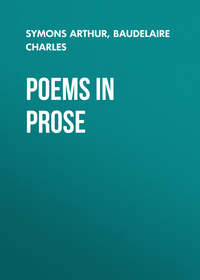Kitap dosya olarak indirilemez ancak uygulamamız üzerinden veya online olarak web sitemizden okunabilir.
Kitabı oku: «Poems in Prose», sayfa 2
A real country of Cockaigne, I assure you, where all is beautiful, clean, and shining, like a clear conscience, like a bright array of kitchen crockery, like splendid jewellery of gold, like many-coloured jewellery of silver! All the treasures of the world have found their way there, as to the house of a hard-working man who has put the whole world in his debt. Singular country, excelling others as Art excels Nature, where Nature is refashioned by dreams, where Nature is corrected, embellished, re-moulded.
Let the alchemists of horticulture seek and seek again, let them set ever further and further back the limits to their happiness! Let them offer prizes of sixty and of a hundred thousand florins to whoever will solve their ambitious problems! For me, I have found my "black tulip" and my "blue dahlia"!
Incomparable flower, recaptured tulip, allegoric dahlia, it is there, is it not, in that beautiful country, so calm and so full of dreams, that you live and flourish? There, would you not be framed within your own analogy, and would you not see yourself again, reflected, as the mystics say, in your own "correspondence"?
Dreams, dreams ever! and the more delicate and ambitious the soul, the further do dreams estrange it from possible things. Every man carries within himself his natural dose of opium, ceaselessly secreted and renewed, and, from birth to death, how many hours can we reckon of positive pleasure, of successful and decided action? Shall we ever live in, shall we ever pass into, that picture which my mind has painted, that picture made in your image?
These treasures, this furniture, this luxury, this order, these odours, these miraculous flowers, are you. You too are the great rivers and the quiet canals. The vast ships that drift down them, laden with riches, from whose decks comes the sound of the monotonous songs of labouring sailors, are my thoughts which slumber or rise and fall on your breast. You lead them softly towards the sea, which is the infinite, mirroring the depths of the sky in the crystal clearness of your soul; and when, weary of the surge and heavy with the spoils of the East, they return to the port of their birth, it is still my thoughts that come back enriched out of the infinite to you.
IV
The Eyes of the Poor
Ah! you want to know why I hate you to-day It will probably be less easy for you to understand than for me to explain it to you; for you are, I think, the most perfect example of feminine impenetrability that could possibly be found.
We had spent a long day together, and it had seemed to me short. We had promised one another that we would think the same thoughts and that our two souls should become one soul; a dream which is not original, after all, except that, dreamed by all men, it has been realised by none.
In the evening you were a little tired, and you sat down outside a new café at the corner of a new boulevard, still littered with plaster and already displaying proudly its unfinished splendours. The café glittered. The very gas put on all the fervency of a fresh start, and lighted up with its full force the blinding whiteness of the walls, the dazzling sheets of glass in the mirrors, the gilt of cornices and mouldings, the chubby-cheeked pages straining back from hounds in leash, the ladies laughing at the falcons on their wrists, the nymphs and goddesses carrying fruits and pies and game on their heads, the Hebes and Ganymedes holding out at arm's-length little jars of syrups or parti-coloured obelisks of ices; the whole of history and of mythology brought together to make a paradise for gluttons. Exactly opposite to us, in the roadway, stood a man of about forty years of age, with a weary face and a greyish beard, holding a little boy by one hand and carrying on the other arm a little fellow too weak to walk. He was taking the nurse-maid's place, and had brought his children out for a walk in the evening. All were in rags. The three faces were extraordinarily serious, and the six eyes stared fixedly at the new café with an equal admiration, differentiated in each according to age.
The father's eyes said: "How beautiful it is! how beautiful it is! One would think that all the gold of the poor world had found its way to these walls." The boy's eyes said: "How beautiful it is! how beautiful it is! But that is a house which only people who are not like us can enter." As for the little one's eyes, they were too fascinated to express anything but stupid and utter joy.
Song-writers say that pleasure ennobles the soul and softens the heart. The song was right that evening, so far as I was concerned. Not only was I touched by this family of eyes, but I felt rather ashamed of our glasses and decanters, so much too much for our thirst. I turned to look at you, dear love, that I might read my own thought in you; I gazed deep into your eyes, so beautiful and so strangely sweet, your green eyes that are the home of caprice and under the sovereignty of the Moon; and you said to me: "Those people are insupportable to me with their staring saucer-eyes! Couldn't you tell the head waiter to send them away?"
So hard is it to understand one another, dearest, and so incommunicable is thought, even between people who are in love!
